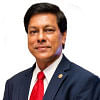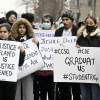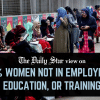We must save the youth from losing their way

Chief Adviser Prof Muhammad Yunus has repeatedly emphasised the importance of youth and their potential to drive positive change. He believes that young people are passionate about building a better world and should be central to strategies for addressing global challenges. Today, Bangladesh stands at the edge of a demographic paradox. With over 27.96 percent of its population aged between 15 and 29 years, the nation ought to be thriving on youthful energy, innovation and resilience. Yet, beneath the surface of this demographic dividend lies a troubling reality: a growing crisis of ethics and civic responsibility among a section of our younger generation. The signs are all around us.
The rise in drug addiction is perhaps one of the most alarming aspects of this crisis. According to the Department of Narcotics Control (DNC), around 75 lakh people in the country are addicted to drugs, with approximately 80 percent of them aged between 15 and 30. In recent years, law enforcement agencies have seized drugs such as cocaine, LSD, crystal meth (ice), yaba, heroin, phensedyl, cannabis, and injectable substances like buprenorphine, etc. A survey on street children conducted by the Bangladesh Bureau of Statistics (BBS), in collaboration with UNICEF, found that over 34 lakh homeless children were without parental care. In another research, the DNC estimated that 58 percent of the street children use one or another type of drug, and 21 percent are being used as drug carriers.
Another worrying issue is the growing lack of respect for law and order. More and more young people are taking the law in their own hands, using violence to punish others. There have been several media reports of young individuals harassing or attacking people in public over matters like clothing or personal relationships. Young girls have been targeted in public places, their attackers often claiming to be defending "cultural values." One shocking example took place on May 9, 2025, when a video that went viral on social media showed a youth beating two underage girls with a belt to "discipline" them, on a launch docked at the Munshiganj launch terminal. Even more alarming was that around 50-60 men stood by, filming the incident and even cheering for the youth. Such actions not only endanger public safety but also weaken the rule of law and damage the social fabric.
Unemployment and economic uncertainty are also major causes of frustration among the youth. At present, Bangladesh has about 26 lakh unemployed people, with 83 percent of them aged 15-29. Some experts believe they are contributing to the rise of teenage gangs, often involved in extortion, street violence, drug peddling, and turf wars.
Technology, though a powerful tool, has become a double-edged sword. While it has connected young people to global ideas, it has also distanced many from their immediate responsibilities to their families, communities, and society. Unregulated digital spaces have become breeding grounds for misinformation, hate, lies, and radical content. From toxic YouTube influencers to aggressive social media trends, young people are constantly exposed to content that promotes violence, instant fame, and a disregard for social norms.
Our political system is also failing the youth. Many young people are used as tools in power struggles, whether on the streets, on social media, or within institutions. Moreover, there are frequent allegations that many of them are involved in illegal money-making activities like extortion and land-grabbing. A study by the World Economic Forum found a staggering 82 percent of young people aged 15-29 having no intention of living in Bangladesh. Undoubtedly, it is the utter failure of our political leadership that it has created a sense of disillusionment and disengagement among our young people.
Education, which should be the foundation for moral development, has also failed in its duty to instil ethical principles in the younger generation. Although literacy rates have improved, our education system does not effectively promote critical thinking, compassion, or civic responsibility. Schools and universities have, in many cases, become platforms for political indoctrination rather than spaces for moral growth. Public universities are frequently dominated by student organisations aligned with political parties. These groups, often backed by institutional powers, operate with impunity, suppressing academic freedom and fostering a culture of fear, bullying, and violence. Political activism, once considered noble, has become a tool for intimidation, power, and control.
One of the most consequential changes, particularly in recent decades, is the deterioration in the bond between parents and children. In the rush to make a living, many parents are unable to provide their children with adequate emotional support or guidance. Instead of spending time with their children, they offer gadgets and unlimited freedom. As a result, many children grow up knowing how to use a smartphone or computer, but not how to care for others or show kindness. They are growing up with weak parental attachments.
We must acknowledge the severity of the situation. The problem is not simply that young people are losing their way. They are being let down, by political leaders who exploit their frustrations, by schools that fail to nurture their conscience, by families too overwhelmed to connect, and by media that misguides more than it mentors. The path to recovery requires a bold and coordinated national response. Families must reclaim their role as emotional anchors, not merely as providers. Schools must embed moral education at their core, teaching respect, responsibility, and empathy as essential life skills. Political leaders must stop exploiting the youth for short-term gains and instead involve them meaningfully in democratic processes through dialogue, policymaking, innovation, and volunteering.
Law enforcement agencies must operate with fairness and impartiality, free from political inte
rference. Crimes such as gender-based violence, gang activity, and online abuse must be addressed promptly and transparently. No cultural or political justification should be allowed to shield wrongdoers. Media platforms—both traditional and digital—have a pivotal role in reshaping youth aspirations. Rather than sensationalising violence and rebellion, they must spotlight role models who embody ethics, service, and integrity.
Nelson Mandela once said, "Our children are our greatest treasure. They are our future. Those who abuse them tear at the fabric of our society and weaken our nation." Bangladesh cannot afford this erosion. If we continue to neglect the moral and emotional nourishment of our young generation, we may end up with a socially bankrupt nation.
Abu Afsarul Haider is an entrepreneur. He can be reached at [email protected].
Views expressed in this article are the author's own.
Follow The Daily Star Opinion on Facebook for the latest opinions, commentaries and analyses by experts and professionals. To contribute your article or letter to The Daily Star Opinion, see our guidelines for submission.

 For all latest news, follow The Daily Star's Google News channel.
For all latest news, follow The Daily Star's Google News channel. 











Comments